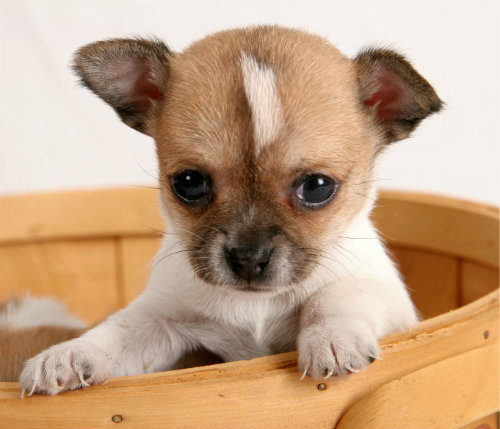This article will mainly focus on house training puppies, but the advice given can generally be applied to house training dogs of any age.

The key to successfully house training dogs or puppies is timing, consistency and patience. Most dogs learn very quickly, but a lot of new dog owners mistakenly allow their dogs to have unrestricted access to the home - Ffor puppies this can be dangerous.
While it may seem like you’re giving your puppy freedom, you’re actually encouraging him to potentially have accidents all over the house, and increasing his risk of chewing electrical wires and swallowing things that could choke your pup or cause a blockage.
Also, once your dog pees or poops in a particular spot, he will go back to that same spot over and over again. If he pees on carpet you'll want to make sure you do a good job of removing every last trace of it as he will be able to smell even the slightest hint of urine.
When house training dogs or pups it’s necessary to contain them in one area when you first bring them home – preferably in a crate, which we'll talk about a little more further down.
It's crucial to understand that puppies have very weak bladder muscles, so they will have more accidents than older dogs. There are however definite times when they are more likely to go potty:
Upon waking
Approximately 5-10 minutes after eating
After playing
After taking a nap
Right before bed time
Watch For The Signs
Puppies, actually all dogs, exhibit signals when they are about to poop or pee. They pace back and forth in a particular area and sniff the ground, as if trying to determine the perfect spot. They may even whine or whimper.
Will You Be Training Him To Go Indoors or Outdoors?
You will need to determine whether you want your dog to be trained to go indoors or outdoors. If you want to train your dog to do both, it’s important to only focus on one method at a time.
Usually apartment dwellers benefit the most from house training their dogs to go indoors, because they don’t have the benefit of a backyard. Also, it’s difficult to pick up your dog and race down a flight of stairs when you suddenly realize he’s about to poop.
In this situation it’s easier to house train dogs to go indoors on pads or newspaper. You will have to set up a schedule in order to know when your puppy needs to go.
Here is a typical schedule that you can follow. Of course, you can tailor this to suit your own personal requirements:
House Training Schedule For A Puppy
(An older dog will need to empty his bladder after waking up in the morning, eating, exercise and before going to sleep at night.)
- 7am Wakes – Toilet/wee pad
- 9am First meal, then toilet
- 11am Sleep
- 1pm Second meal, then toilet
- 3pm Sleep
- 5pm Play time, then toilet
- 7pm Third meal, then toilet
- 9pm Sleep
- 11pm Toilet visit before bed
Stay Home Initially To Train Your Dog
If you haven't brought your dog or puppy home yet, it's strongly advise you take some time off work so you can be with him consistently.
The first few weeks are crucial in terms of house training dogs and they need you to be there to show them where it’s acceptable to go. You might be able to think of better ways to spend your vacation time, but apart from making potty training go more smoothly it will help you and your dog bond more quickly, and having someone around will make it easier for a young puppy to adjust to life without its litter mates and mother.
Crate Training
The fastest way to house train dogs is via crate training. Buy a crate that’s large enough for the dog or puppy to stand, stretch and sleep. He should not be able to roam around freely in his crate.
The idea behind crate training is that dogs don’t poop where they sleep and eat, and his crate is where he will be sleeping and eating. Try not to keep your puppy in his crate any longer than 2 – 3 hours at a time.
After 2 – 3 hours, let him out of his crate and watch him carefully for signs of sniffing and pacing. When you see him start to go potty, pick him up quickly and take him to his pad or newspaper.
Supervise Your Puppy at All Times
Always be mindful of how long your puppy is in his crate. Between crate training sessions, let your puppy out, play with him, and always keep a sharp eye on him so he doesn’t have accidents.
Accidents will happen though, so be patient and never scold your puppy or get angry with him. Also, never use his crate as a punishing device. His crate is his den and he should be allowed to view it as his sanctuary.
Follow these tips for house training dogs and puppies and in no time you’ll have a potty trained pooch you can confidently leave at home for several hours at a time.
